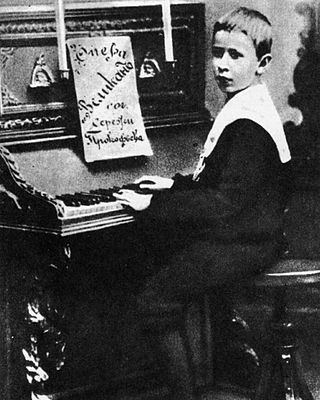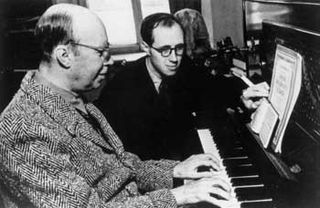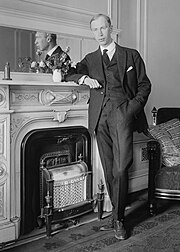
Sergei Sergeyevich Prokofiev was a Russian composer, pianist, and conductor who later worked in the Soviet Union. As the creator of acknowledged masterpieces across numerous music genres, he is regarded as one of the major composers of the 20th century. His works include such widely heard pieces as the March from The Love for Three Oranges, the suite Lieutenant Kijé, the ballet Romeo and Juliet—from which "Dance of the Knights" is taken—and Peter and the Wolf. Of the established forms and genres in which he worked, he created—excluding juvenilia—seven completed operas, seven symphonies, eight ballets, five piano concertos, two violin concertos, a cello concerto, a symphony-concerto for cello and orchestra, and nine completed piano sonatas.

Nikolai Andreyevich Rimsky-Korsakov was a Russian composer, a member of the group of composers known as The Five. He was a master of orchestration. His best-known orchestral compositions—Capriccio Espagnol, the Russian Easter Festival Overture, and the symphonic suite Scheherazade—are staples of the classical music repertoire, along with suites and excerpts from some of his 15 operas. Scheherazade is an example of his frequent use of fairy-tale and folk subjects.

Tikhon Nikolayevich Khrennikov was a Russian and Soviet composer, pianist, and General Secretary of the Union of Soviet Composers (1948–1991), who was also known for his political activities. He wrote three symphonies, four piano concertos, two violin concertos, two cello concertos, operas, operettas, ballets, chamber music, incidental music and film music.

Reinhold Moritzevich Glière, was a Russian Imperial and Soviet composer of German and Polish descent. In 1938, he was awarded the title of People's Artist of RSFSR (1935), and People's Artist of USSR (1938).

Nikolai Yakovlevich Myaskovsky, was a Russian and Soviet composer. He is sometimes referred to as the "Father of the Soviet Symphony". Myaskovsky was awarded the Stalin Prize five times.

Romeo and Juliet, Op. 64, is a ballet by Sergei Prokofiev based on William Shakespeare's play Romeo and Juliet. First composed in 1935, it was substantially revised for its Soviet premiere in early 1940. Prokofiev made from the ballet three orchestral suites and a suite for solo piano.

The Stone Guest is an opera in three acts by Alexander Dargomyzhsky from a libretto taken almost verbatim from Alexander Pushkin's 1830 play of the same name which had been written in blank verse and which forms part of his collection Little Tragedies.

The Fiery Angel, Op. 37, is an opera by Russian composer Sergei Prokofiev. The opera was composed between 1919 - 1927. It was premiered posthumously in 1955 in Venice, in Italian language. The work was not presented to Russian audiences until the 1990s, most notably by the Mariinsky Theatre, after the dissolution of the Soviet Union.

War and Peace is a 1946 230-minute opera in 13 scenes, plus an overture and an epigraph, by Sergei Prokofiev. Based on the 1869 novel War and Peace by Leo Tolstoy, its Russian libretto was prepared by the composer and Mira Mendelson. The first seven scenes are devoted to peace, the latter six, after the epigraph, to war.

The Symphony No. 6 in E-flat minor, Op. 111, by Sergei Prokofiev was completed and premiered in 1947. Sketches for the symphony exist as early as from June 1945; Prokofiev had reportedly begun work on it prior to composing his Fifth Symphony. He later remarked that the Sixth memorialized the victims of the Great Patriotic War.
Russian opera is the art of opera in Russia. Operas by composers of Russian origin, written or staged outside of Russia, also belong to this category, as well as the operas of foreign composers written or intended for the Russian scene. These are not only Russian-language operas. There are examples of Russian operas written in French, English, Italian, Latin, Ancient Greek, Japanese, or the multitude of languages of the nationalities that were part of the Empire and the Soviet Union.

Monna Vanna is an unfinished opera by Sergei Rachmaninoff after a play by Maurice Maeterlinck. Rachmaninoff had completed Act I in short vocal score, with piano accompaniment, and then he went to ask for permission to set the text in a full three-act treatment. However, another composer, Henry Février, had by then received the rights to an operatic setting of the text. Had Rachmaninoff proceeded to a complete operatic setting, such a work could not have been produced in European countries that were signatories to copyright laws that covered the work of Maeterlinck. This opera could only have been produced in countries that at the time were not signatories to European copyright law, such as Russia. Ultimately, Rachmaninoff abandoned further work on this opera and never wrote a complete setting.
A Florentine Tragedy is a fragment of a never-completed play by Oscar Wilde. The subject concerns Simone, a wealthy 16th-century Florentine merchant who finds his wife Bianca in the arms of a local prince, Guido Bardi. After feigning hospitality, Simone challenges the interloper to a duel, disarms him, and strangles him. This awakens the affection of his wife; and the two are reconciled.

Demon is an opera in three acts by Russian composer Anton Rubinstein. The work was composed in 1871. The libretto was by Pavel Viskovatov, based on the poem of the same name by Mikhail Lermontov.
The Story of a Real Man is an opera in four acts by the Russian composer Sergei Prokofiev, his opus 117. It was written from 1947 to 1948, and was his last opera.
Konstantin Saradzhev was an Armenian conductor and violinist. He was an advocate of new Russian music, and conducted a number of premieres of works by Pyotr Ilyich Tchaikovsky, Modest Mussorgsky, Igor Stravinsky, Sergei Prokofiev, Nikolai Myaskovsky, Dmitri Shostakovich, and Aram Khachaturian. His son Konstantin Konstantinovich Saradzhev was a noted bell ringer and musical theorist.

The Giant is an opera in three acts by Sergei Prokofiev. The 12 page work was written for performance by the nine-year-old composer's family.

The Cello Sonata in C major, Op. 119, was composed by Sergei Prokofiev in 1949. The year before, Prokofiev was accused of formalism by the Zhdanov Decree and much of his music was banned. However, he continued to compose music, though he was not sure if his new works would ever be performed in public.

On Guard for Peace, also translated as On Guard of Peace, Op. 124 is an oratorio by Sergei Prokofiev scored for narrators, mezzo-soprano, boy soprano, boys choir, mixed choir, and symphony orchestra. Each of its ten movements sets texts by Samuil Marshak, who had collaborated previously with the composer in the work Winter Bonfire, Op. 122.

The Decembrists is an historical opera by Yuri Shaporin with libretto by Vsevolod Rozhdestvensky, Aleksey Tolstoy and others. It was premiered in 1953 after a long and difficult period of composition lasting some 30 years. In a style highly reminiscent of the great 19th-century Russian composers, especially Borodin, Mussorgsky and Tchaikovsky, it gives a rather fictionalized account of the 1825 Decembrist revolt of Russian army officers against the Tsarist government. Frequently performed in the Soviet Union, where it was seen as the culmination of Shaporin's career, it has never been well known in the West except through its most popular number, the Soldiers' Chorus.















